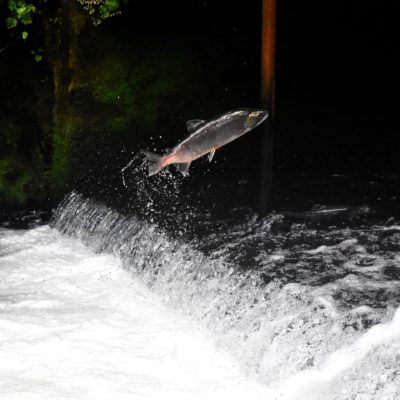Many people agree that reconciliation with Indigenous Peoples is an important goal but are stumped as to what that might look like. Below, Rachel Krause describes an example involving the Canadian government, environmental conservation and the management of fisheries. What would churches look like if they too “considered all practices and ongoing and future programming through the lens of reconciliation?”

by Rachel Krause
Reconciliation between indigenous and settler peoples has become a central issue in Canada. At the federal level, the work of reconciliation was set off by the Truth and Reconciliation Commission (TRC), which was one element of the Indian Residential Schools Settlement Agreement, a landmark class-action settlement to survivors of the Indian residential school system.
Indian residential schools were in operation for over 100 years and led to over 150,000 indigenous children being forcibly removed from their families, resulting in the deaths of over 6,000 children and intergenerational trauma that continues to this day. Since the TRC completed its work in 2015, the national project of reconciliation has expanded into all aspects of civic life, including the justice, education, and health systems.
What does reconciliation have to do with conservation?
One of the places where the “rubber meets the road” for reconciliation in Canada is in resource sharing. Fisheries in particular in Canada hold strong cultural and economic value. Take as an example the Pacific salmon, which are of significant and ongoing cultural importance to the coastal First Nations who rely on salmon not only for physical and economic well-being, but also as a source of cultural and spiritual identity.
As the federal department responsible for managing fisheries and protecting fish habitat, Fisheries and Oceans Canada (DFO), has an important role to play in bringing together reconciliation and conservation. In 2019, DFO published their Reconciliation Strategy, in which they state, “We recognize that fisheries, oceans, aquatic habitat and marine waterways are of great social, cultural, spiritual and economic importance to many Indigenous peoples. We’re committed to building renewed nation-to-nation, Inuit-Crown and government-to-government relationships with First Nations, Inuit and Métis peoples.”
An evolving relationship, not just a few adjustments
According to their own documents, DFO recognizes that this isn’t simply a matter of adjusting fishing policies to provide better access for Indigenous communities. Rather, “Reconciliation is an ongoing journey and ever-evolving relationship.” DFO’s Reconciliation Strategy resulted from an Indigenous Program Review, co-led with the National Indigenous Fisheries Institute. Indigenous partners and technical experts worked together to examine the historical and present-day experiences of Indigenous fishers, strengths and weaknesses of programs, and successes and further opportunities in capacity-building for Indigenous communities. Most importantly, the review called for DFO to “Ignite a Culture Change” by considering all practices and ongoing and future programming through the lens of reconciliation.
Conservation of fisheries throughout Canada will only be possible within the context of real partnerships being Indigenous and settler stakeholders. 2019 was a tough year for Pacific salmon, with temperatures warmer than usual causing extra stress to migrating salmon, and dramatic stories of salmon being lifted by helicopter over unpassable sections of the Fraser River after a landslide cut them off completely from their spawning grounds last July. Under climate change, salmon are predicted to have an even harder time of it. Indigenous communities are at the forefront of protecting vital salmon habitat.
The church has an important role to play in truth and reconciliation in Canada, and there has been significant work through our various church bodies and institutions to answer this call, including through holding our governments accountable for the commitments they have made. It is heartening to see the federal government also work at answering this call in important and tangible ways that acknowledge the importance of the water and the creatures living in it to Indigenous communities and their ability to heal and thrive.
Rachel Krause grew up in British Columbia’s Fraser Valley but now lives in Winnipeg, Man., where she is an assistant professor of biology at Canadian Mennonite University. Her teaching focuses on ecology and global health. She has collaborated with multiple government agencies and non-profit organizations on research related to fish conservation. Rachel attends Hope Mennonite Church in Winnipeg, Man.
Sources Cited
Articles
- ‘Reconciliation is not an aboriginal problem, it is a Canadian problem. It involves all of us.’, CBC Radio
- Life, Salmon, and the Future for the ‘Namgis First Nation, Vice
- Three quarters of Fraser sockeye face bottleneck due to rock slide, Vancouver Sun
- Sockeye Salmon and Climate Change, World Wildlife Fund: Stories
Organizations
Government of Canada: Fisheries and Oceans Canada
Government of Canada:
Mennonite Church Canada
National Indigenous Fisheries Institute
